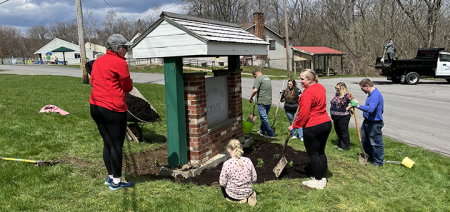Health Department Urges Residents To Get Vaccinated Against The Flu
Published:
December 2nd, 2022
CHENANGO COUNTY — The Chenango County Health Department is urging everyone six months and older to receive a flu vaccine as cases of influenza rise across the state.
There are early signs that this flu season could be severe. Data show that the flu season is ramping up early. Flu hospitalizations are higher at this point in the season than they have been in a decade. Flu is also spreading at the same time as other respiratory illnesses, including RSV and COVID-19.
According to the State Health Department, vaccinations should continue throughout flu season, as long as flu viruses are circulating. Flu vaccine can vary in how well it works but remains the best way to prevent illness and influenza complications, including those that can lead to hospitalization. Even when flu vaccine does not prevent illness, it still lessens the severity and shortens the duration of the flu.
To receive a flu shot, contact your local health care provider, a local retail pharmacy, or by contacting the Chenango County Public Health Nursing Division at 607-337-1660.
Unlike a cold, flu symptoms come on fast and may include fever, cough, sore throat, runny or stuffy nose, body aches, headache, chills, and fatigue. Some people may also have vomiting and diarrhea. People infected with influenza may have respiratory symptoms without a fever.
The Chenango County Public Health Department states: “People with the flu should drink plenty of liquids, rest and contact their health care provider if they feel very ill or do not seem to rebound after a few days. If you think you have the flu, you should stay home to avoid spreading it to others.”
The State Health Department recommends that people who are very sick, or people who are sick and at high risk of serious complications of the flu, be treated early with flu antiviral drugs. Antiviral drugs work best when started within two days of symptoms first appearing. There are no current shortages of antiviral drugs, and manufacturers report they expect to meet projected seasonal demands.
Since the flu virus can spread through coughing or sneezing, it is especially important for family members and people who have regular contact with high-risk individuals to be vaccinated.
Those at highest risk for complications from flu include people 65 years and older, children younger than five years old, pregnant women, and people of any age with chronic, long-term health problems such as heart or lung disease, kidney problems, diabetes, asthma, anemia, HIV/AIDS, or other illnesses that suppress the immune system.
For more information on the current flu season and how to protect yourself and your family, visit the State Health Department website at health.ny.gov/flu. For information on the prevalence of flu in New York State this week, visit Influenza Surveillance Report (ny.gov)
Persons with questions or requiring additional information may contact the Chenango County Health Department at 607-337-1660.
-Information provided by the Chenango County Health Department
Comments








